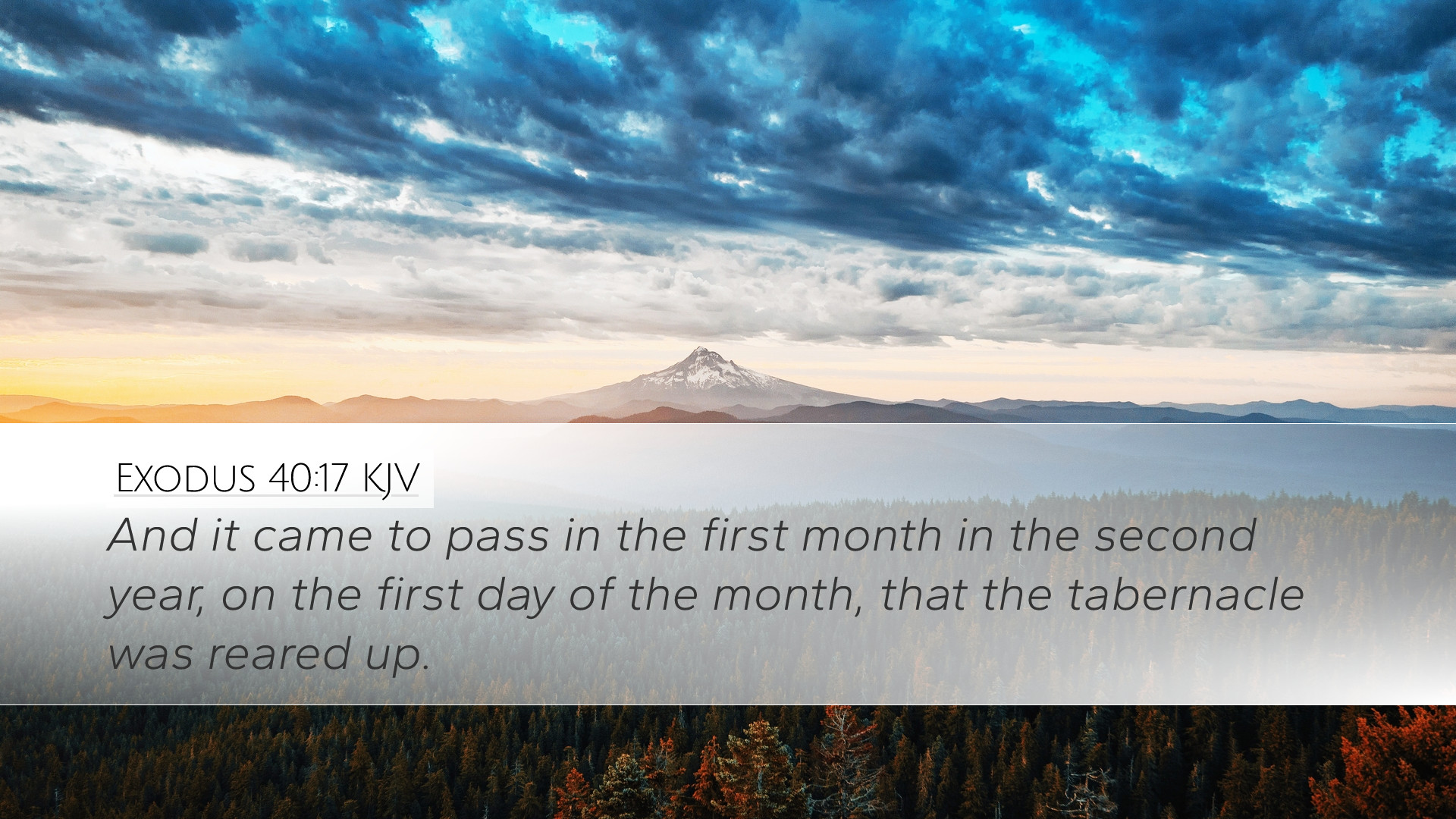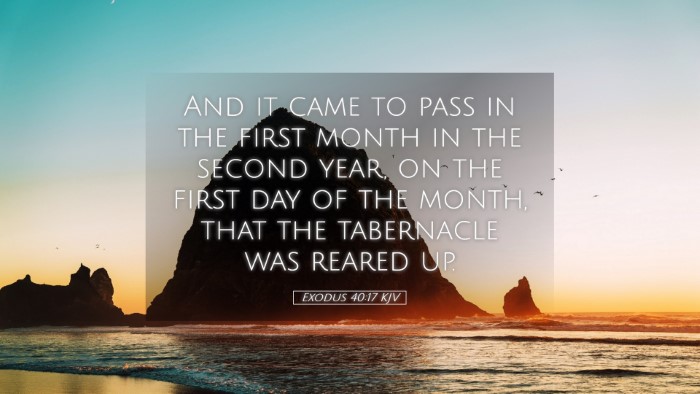Commentary on Exodus 40:17
Exodus 40:17: "And it came to pass in the first month, in the second year, on the first day of the month, that the tabernacle was reared up."
Contextual Overview
This verse marks a significant milestone in the history of Israel, occurring exactly one year after their exodus from Egypt. The construction and dedication of the Tabernacle now take its pivotal place in their worship. This marks not only a physical structure being erected but the formal establishment of God's presence among His people.
Historical Significance
- Timing: The timing of the Tabernacle's completion emphasizes God’s faithfulness and the fulfillment of His promises. It denotes the beginning of a new phase in Israel's journey towards the Promised Land.
- Structure: The Tabernacle itself served as a portable dwelling place for God, symbolizing His desire to dwell among His people. The meticulous details provided in preceding chapters highlight God's holiness and the importance He places on worship.
Insights from Commentaries
Matthew Henry's Commentary
Henry discusses the significance of the Tabernacle, emphasizing the idea of God wanting to dwell among His people. The rearing up of the Tabernacle demonstrates not merely God's presence but His commitment to lead and guide His people. Henry notes:
"It was the first day of the first month; this signified that they had a new beginning, a new opportunity for worship and fellowship with the Almighty."
Albert Barnes' Notes on the Bible
Barnes adds that the Tabernacle's erection signifies a sacred moment in Israel's spiritual journey. He draws attention to the logistics surrounding the setting up of the Tabernacle, which required careful planning as outlined in prior chapters:
"The precise actions taken here, setting up the Tabernacle, are a foreshadowing of the future institution of worship that would be centered in Jerusalem."
Barnes also emphasizes that the Tabernacle was more than just a physical structure; it was foundational for Israel’s community identity and worship practices.
Adam Clarke's Commentary
Clarke elaborates on the specific date mentioned in Exodus 40:17, reflecting upon the importance of the timing regarding Israel’s calendar. He explains that it signifies:
"A fresh start, an inauguration into a new life of communion with God, the old life of bondage in Egypt replaced with one of divine guidance."
Furthermore, Clarke underscores the kind of worship that would take place in the Tabernacle, describing it as a shadow of things to come in Christ, making the symbolism of the Tabernacle profoundly significant for New Testament theology.
Theological Implications
The establishment of the Tabernacle in Exodus 40:17 has rich theological implications:
- The Nature of God's Presence: The vindication that God desires to be in close relationship with humanity, which finds its ultimate fulfillment in Jesus Christ as 'Emmanuel.'
- Worship and Sacrifice: The Tabernacle underlines the necessity of a sacrificial system in approaching God, which, in Christian theology, points forward to Christ’s ultimate sacrifice.
- The Community of Believers: The Tabernacle served as a central point for communal worship, reflecting the importance of gathering together in the presence of God.
Practical Applications for Believers
As we reflect on Exodus 40:17, it's compelling for Christians today:
- Recognizing God's Faithfulness: Just as God kept His promise to be with Israel, believers can trust in His promises today.
- Embracing Worship: The Tabernacle reminds us that worship is central to our lives, and we must prioritize coming together in His presence.
- Understanding Holiness: The construction of the Tabernacle also calls us to understand and respect the holiness of God as we approach Him in worship.
Conclusion
Exodus 40:17 serves as a powerful reminder of God's covenant faithfulness and the establishment of a communal identity centered around His presence. The insights drawn from commentaries enrich our understanding of this foundational event in the life of Israel and its enduring significance in Christian theology. Pastors, students, and scholars alike can draw from this passage a wealth of spiritual nourishment as they seek to understand God's ongoing relationship with His people.


